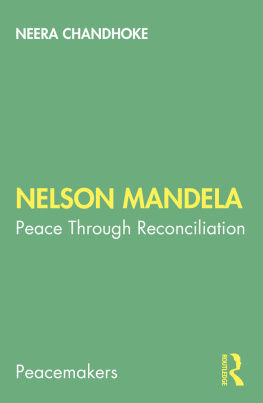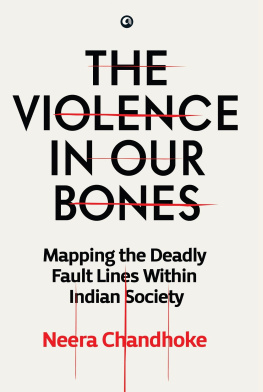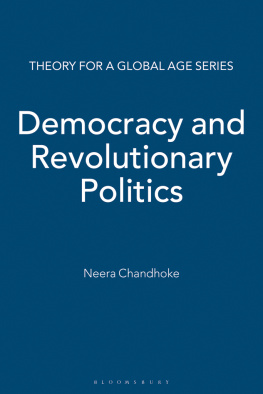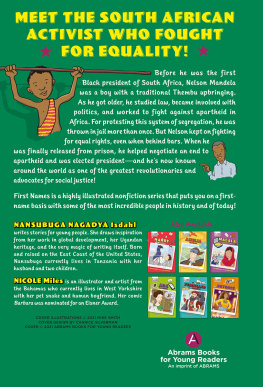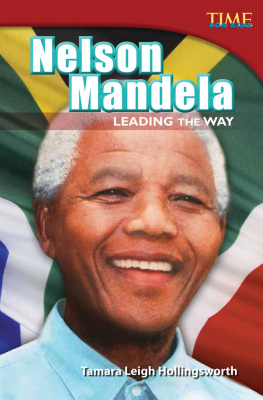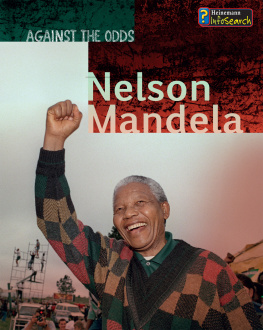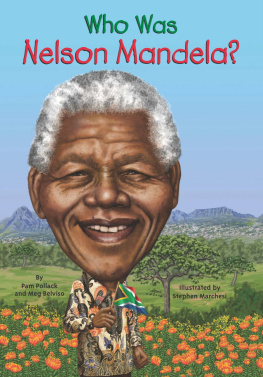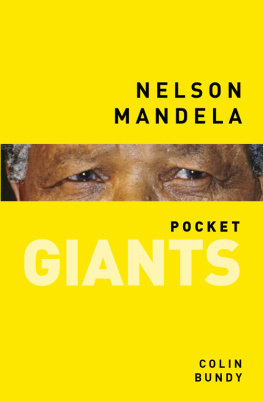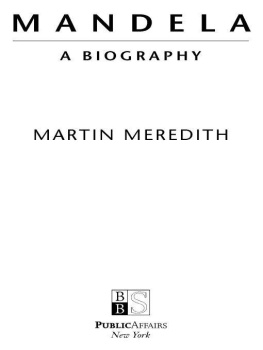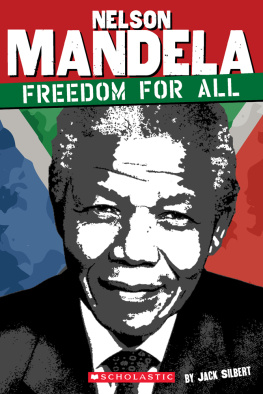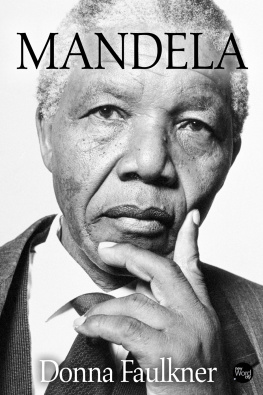Nelson Mandela
This book reflects on the life and politics of Nelson Mandela (19182013) and his efforts to broker peace and reconciliation in a deeply divided country. Through examples from apartheid and post-apartheid South Africa, it explores conflict and methods for realising peace, social justice, and democracy.
The book looks at the festering of animosity and racial bitterness between the white Afrikaner community and the black community during years of racial violence, injustices, and authoritarianism in South Africa. In the most violent phase of the countrys history, Mandela offered to both communities peaceful means to ensure equality, justice, and inclusivity. The author highlights the extraordinary challenges which Mandela faced in mobilising consent and persuading both the black and the Afrikaner community to acquiesce to a peaceful transfer of power. The volume further details the socio-political contexts and negotiations which resulted in the swift transfer of power, Mandelas insistence on crafting inclusive systems of nationhood, his multi-cultural cabinet, and the institutionalisation of a Truth and Reconciliation Commission to address challenges facing the two communities in the post-conflict period.
An accessible introduction to one of the greatest leaders in contemporary history, this book will be essential reading for scholars and researchers of peace and conflict studies, social exclusion and discrimination, critical race theory, human rights, politics, decolonisation and post-colonial studies, sociology, and history.
Neera Chandhoke is Distinguished Fellow at the Centre for Equity Studies, New Delhi. Prior to this, she was Professor of Political Science at the University of Delhi and Director of Developing Countries Research Centre at the University of Delhi. Her recent publications include Rethinking Pluralism, Secularism, Tolerance: Anxieties of Co-Existence, 2019; Democracy and Revolutionary Politics, 2015; and Contested Secessions, 2012. Her forthcoming work is titled Violence in Our Bones.
Peacemakers
Series Editor: Ramin Jahanbegloo
Executive Director of the Mahatma Gandhi Centre for Nonviolence and Peace Studies and the Vice-Dean of the School of Law at Jindal Global University, India
Peace is one of the central concepts in the spiritual and political life of humanity. Peace does not imply the absence of war. It implies harmony, justice and empathy. Empathy is the key to education of peace in our world. In other words, despite the vast differences of values between cultures and traditions, it is still possible to grasp an understanding of one another, by empathy. Throughout centuries, peacemakers have endorsed a shared human horizon which according to them had the critical force of avoiding moral anarchy and relativism while acknowledging the plurality of modes of being human.
Today in a different manner and in a changed tone, but with the same moral courage and dissenting voice, this series on Peacemakers offers the first comprehensive engagement with the problems of peace in our age, through a meticulous and thorough study of the lives and thoughts of peacemakers of all ages.
THE 14TH DALAI LAMA
Peacekeeping and Universal Responsibility
Mario I. Aguilar
NELSON MANDELA
Peace Through Reconciliation
Neera Chandhoke
For more information about this series, please visit: www.routledge.com/Peacemakers/book-series/PCMK
First published 2022
by Routledge
2 Park Square, Milton Park, Abingdon, Oxon OX14 4RN
and by Routledge
605 Third Avenue, New York, NY 10158
Routledge is an imprint of the Taylor & Francis Group, an informa business
2022 Neera Chandhoke
The right of Neera Chandhoke to be identified as author of this work has been asserted by her in accordance with sections 77 and 78 of the Copyright, Designs and Patents Act 1988.
All rights reserved. No part of this book may be reprinted or reproduced or utilised in any form or by any electronic, mechanical, or other means, now known or hereafter invented, including photocopying and recording, or in any information storage or retrieval system, without permission in writing from the publishers.
Trademark notice: Product or corporate names may be trademarks or registered trademarks, and are used only for identification and explanation without intent to infringe.
British Library Cataloguing-in-Publication Data
A catalogue record for this book is available from the British Library
Library of Congress Cataloging-in-Publication Data
A catalog record for this book has been requested
ISBN: 978-0-367-35308-7 (hbk)
ISBN: 978-0-367-35329-2 (pbk)
ISBN: 978-0-429-33071-1 (ebk)
Typeset in Sabon
by Apex CoVantage, LLC
Ramin Jahanbegloo
Peace is one of the central concepts of the spiritual and political life of humanity. When we study the worlds religious and philosophical teachings, whether they are from the East or the West, we see that one of the basic ideals of all religions is peace. Peace does not imply simply absence of war. It implies harmony, justice, and empathy. Empathy is the key to education of peace in our world. In other words, despite the vast differences of values between cultures and traditions, it is still possible to grasp an understanding of one another by empathy. Therefore, we can maintain that all cultures have a shared core of common humanity. Throughout centuries, peacemakers endorsed a shared human horizon, which according to them had the critical force of avoiding moral anarchy and relativism while acknowledging the plurality of modes of being human. As a matter of fact, the first step for peacemakers has always been to assume that not only are there differences among nations, cultures, and traditions of thought but also to admit that people may have different value systems which need to be understood and approached dialogically and critically. Philosophy of peace is, thus, expressed here in the idea of a self-respecting community or nation which strives to remove its own imperfections instead of necessarily judging others. As a result, peacemaking is always a call not only to cultivate humility but also to foster pluralism. Such a view is essential if we are to avoid the danger of cultural conformity and move towards the recognition of shared values of humanity and the acceptance of what Martin Luther King, Jr. called the cosmic companionship. Put differently, we can say that it would be an error to hope that we can ever achieve a truly universal vision of peace without an intercultural approach to the idea of civilisation. Peacemakers have always been in favour of a farsighted peacemaking in our world which has seriously advocated the logic of solidarity and civic friendship beyond national selfishness and global exclusion. Let us not forget that all peacemakers, either man or woman, young or old, from the West or the East, were all engaged in the process of peace seeking by fighting for care, openness, and empathy as constructive forms of being together. Today in a different manner and in a changed tone, but with the same moral courage and dissenting voice, this series on Peacemakers offers the first comprehensive engagement with the problems of peace in our age, through a meticulous and thorough study of the lives and thoughts of peacemakers of all ages.

